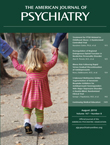In This Issue
Clinical Guidance: S-Adenosyl Methionine Augmentation of Antidepressant Treatment
Adding S-adenosyl methionine (SAMe) to a selective serotonin reuptake inhibitor resulted in an increased remission rate (26%) compared to the addition of placebo (12%). This was the first randomized, controlled trial for this additive, which is widely available as a dietary supplement. The 6-week trial, conducted by Papakostas et al. (p. Original article: 942) and supported by the National Institute of Mental Health, had a target dose of 800 mg twice daily. Weight loss occurred in both treatment groups but was less in the SAMe group. There were no serious adverse effects. An editorial by Craig Nelson (p. Original article: 889) points out that the results are clinically significant but warns that dosage may be confusing because of differences in formulations of this over-the-counter product.
Opioid Function in Borderline Disorder
Brain regions implicated in emotion and stress responses show less stability of the endogenous opioid system in individuals with borderline personality disorder than in healthy comparison subjects. Using positron emission tomography, Prossin et al. (CME, p. Original article: 925) revealed that women with borderline personality disorder in a neutral emotional state had greater concentrations of μ-opioid receptors, indicating lower regulatory control. Activation of the opioid system during induced sadness also differed between groups in several brain regions. The editorial by Drs. New and Stanley (p. Original article: 882) relates these findings to self-injurious behavior and social dysfunction in borderline personality disorder.
Clinical Guidance: Abrupt Discontinuation of Antidepressants Increases Recurrence
Abrupt discontinuation of antidepressants increases the likelihood of recurrence of depression over the next 12 months, report Baldessarini et al. (p. Original article: 934). Among patients whose depression was in remission who stopped taking antidepressants, discontinuation over less than 1 week was most often initiated by patients themselves and resulted in a median time to relapse of less than 4 months (figure). Discontinuation over 2 weeks was generally directed by psychiatrists and resulted in a median time to relapse of over 9 months. Enhanced recurrence with abrupt discontinuation occurred with both selective serotonin reuptake inhibitors and tricyclic antidepressants, especially those with short half-lives, e.g., paroxetine and venlafaxine. Depressed bipolar I patients were more affected than patients with other types of depression. Unexpected pregnancy might occasion rapid discontinuation of antidepressants, but Wisner et al. (Am J Psychiatry 2009; 166:Original article: 557) found that depression and antidepressant treatment convey similar risks of premature birth. Thus, more gradual discontinuation to minimize relapse risk seems advisable even during pregnancy.

Clinical Guidance: Psychotherapies for PTSD in Women With Abuse Histories
Posttraumatic stress disorder (PTSD) resulting from chronic abuse in childhood, also called complex PTSD, responded to a two-stage treatment in a study by Cloitre et al. (p. Original article: 915). In the first 8 weekly sessions, dialectical behavior therapy was used, first to help teach emotional regulation and then to enhance interpersonal skills. The next 8 weeks were devoted to analyzing maladaptive interpersonal relationships and reactions to narratives about the traumas. Substituting supportive therapy for these specific therapies in either the first or second 8 weeks decreased the effect significantly, which suggests that both skills training and reexposure to trauma are necessary for optimal response. Of the women who received both treatments, 27% had sustained remission, significantly greater than the women in the two control groups. Dr. Richard Bryant in an editorial (p. Original article: 879) endorses emotional preparation of the women in the first 8 weeks, prior to exposure therapy, and notes the 6 months' sustained effect.



